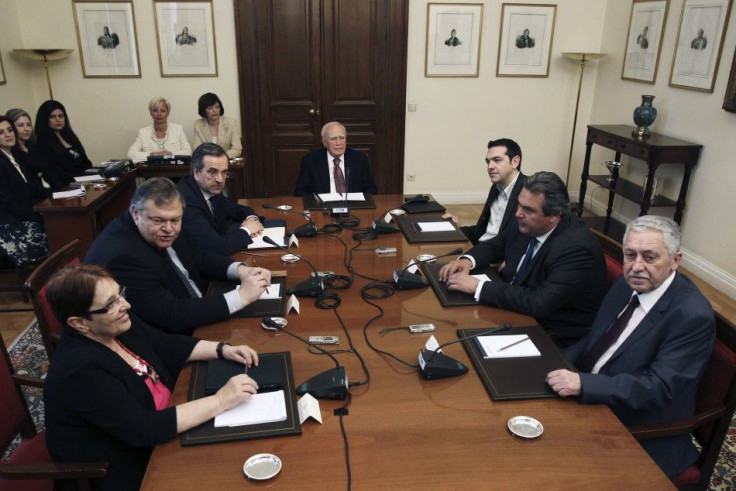Greece Sets New Elections, To Form Interim Caretaker Government

Debt-scarred Greece will hold another election on June 17, following repeated failures by bickering political parties to form a coalition government in the wake of a fractious parliamentary poll from almost two weeks ago that did not result in any one faction winning a majority of votes.
Meanwhile, Greek President Karolos Papoulias has appointed a senior judge, Council of State president Panagiotis Pikramenos, to form a caretaker government during the interim. It is not yet clear who would comprise the emergency cabinet as the country prepares for the new election.
Last-ditch efforts to form a unity government on Tuesday failed, leading Papoulias to call these extraordinary measures.
However, polls suggest that the Radical Left party (Syriza) – which is vehemently opposed to Greece’s austerity measures and the terms of huge bailouts from the European Union and International Monetary Fund – will win the next election (but not gain a parliamentary majority).
Syriza’s leader, Alexis Tsipras, has so far scuttled every attempt to create a new government that would abide by austerity.
At a minimum, Syriza (which gained an impressive second place finish in the May 6 election) wants to re-negotiate terms of the EU/IMF rescue package, although Tsipras reportedly does not want Greece to exit the euro.
Meanwhile, with no end in sight to the political stalemate in Athens, some EU leaders are growing fearful that Greece will keep sliding down a financial hole and are now openly speaking of the country leaving the euro currency bloc.
The EU has already warned Greek officials they must abide by the strict terms of austerity.
“The 16 other governments in the euro zone really are at the end of their patience with Greece. There isn't room or any willingness to move, said an unnamed official at the European Commission, according to the Daily Telegraph newspaper of Britain.
The decisions are really in Athens' hands. But it doesn't look good.
However, two prominent European officials, German Chancellor Angela Merkel and European Council President Herman Van Rompuy, while expressing concern about the deadlock in Greece, claim they do not want to see a Greek departure from the euro zone.
We're not planning for a Greek exit, nobody is planning for a Greek exit, Richard Corbett, a spokesman for Van Rompuy, told BBC radio.
That would not help Greece, it would not help the rest of the European Union and technically, by the way, it's an extraordinarily difficult thing to do. The idea of planning a Greek exit would risk being a self-fulfilling prophecy.
But financial markets around the world are pricing in a Greek exit -- the euro is falling, equities have been dropping, while Euro bond yields in Italy and Spain (two other European nations with shaky debt profiles) are rising. Moreover, Greek depositors have reportedly withdrawn almost $900-million from banks over the past few days fearing a euro exit.
There is a bit of schizophrenia in our society right now. People want to stay in Europe - have the cake - but they also want to eat it - by attacking the creditors, Theodore Couloumbis at Athens-based think-tank ELIAMEP told the Telegraph.
Much depends on whether the Greek people in this repeat election are going to vote with anger and passion or if they will cool off, reflect and see in effect what the real choices are. The choice is between bad and worse.
Beleaguered Greeks may find some solace in the words of Francois Hollande, the newly elected Socialist president of France, who basically ran on an anti-austerity platform.
After his initial meeting with Merkel on Tuesday, Hollande declared: I hope that we can say to the Greeks that Europe is ready to add measures to help growth and support economic activity so that there is a return to growth in Greece.
© Copyright IBTimes 2025. All rights reserved.





















